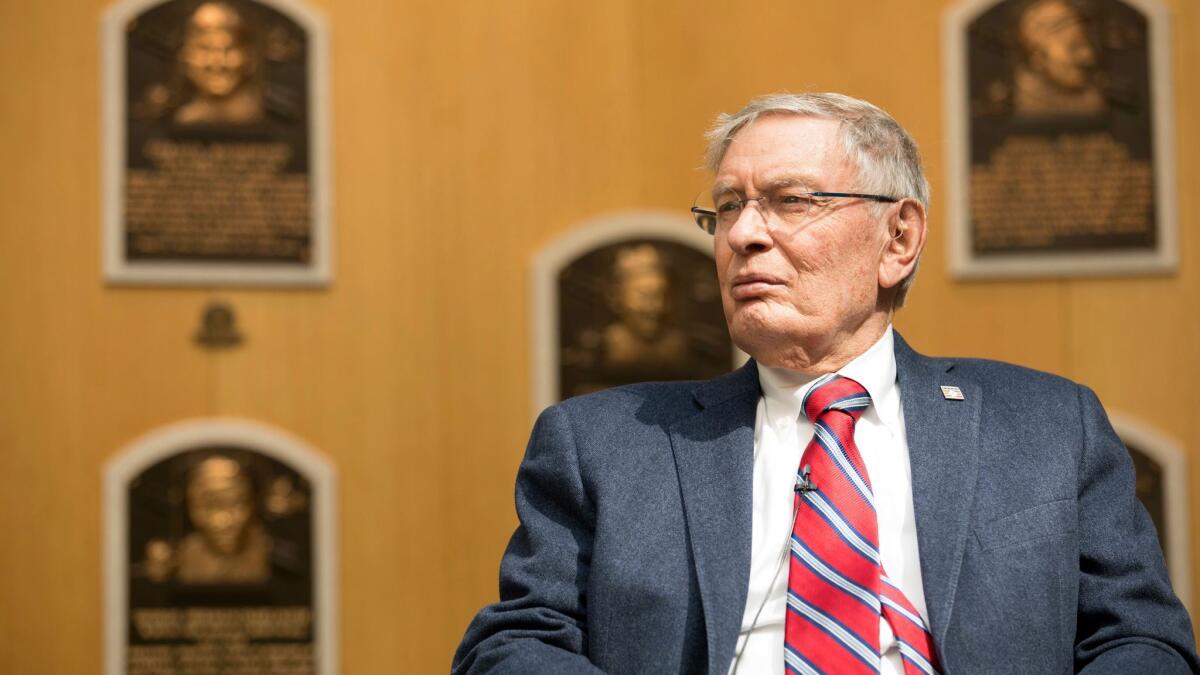By pushing Frank McCourt aside, Bud Selig helped set the stage for Dodgers in World Series

- Share via
The mention of Bud Selig does not usually inspire a warm and fuzzy feeling among baseball fans. He called off a World Series in the middle of a labor dispute, memorably shrugged his shoulders and threw up his hands when an All-Star game ended in a tie and on his watch steroids exploded into the baseball vernacular.
But with the Dodgers playing in their first World Series since 1988, their fans ought to raise their glasses and toast the former commissioner. The Dodgers probably wouldn’t be here without him.
Get into the club of baseball owners, and you’re pretty much in until you sell or die, no matter how persistently mediocre your team might be. However, Selig considered the sins of Frank McCourt so grave that he pushed him out of ownership, setting the stage for Mark Walter and his partners at Guggenheim Baseball to buy the Dodgers out of bankruptcy court and restore them to glory.
The Dodgers — the classy home of Jackie Robinson and Sandy Koufax, of Fernando Valenzuela and Clayton Kershaw, of Vin Scully and Jaime Jarrin — had so lost their way that Selig essentially threw their owner out of the game.
“The Dodgers hadn’t lost their way a little bit,” Selig said. “They had lost their way a lot.
“I had to do what I thought was right. When I see the Dodgers today, and the excitement in L.A., was it the right thing to do? Yes, it certainly was. There wasn’t a scintilla of doubt about it then, and I don’t have a scintilla of doubt about it now.
“History will always prove the quality of your decisions, good or bad. This one, while it was historic and unique, there wasn’t a doubt about it.”
If Frank McCourt and his wife Jamie had chosen to settle their divorce privately, he might still own the Dodgers. But they torched each other publicly in what is believed to have been the most expensive divorce proceeding in California history, and court documents revealed that the couple had been diverting revenue from the Dodgers to a luxurious personal lifestyle.
The Dodgers were paying rent to play in their own stadium. The McCourts were spending on side-by-side mansions in Holmby Hills and in Malibu, house calls from hairdressers and a Russian physicist who promised he could help the Dodgers win by thinking about it — that is, by transmitting his brain energy to the team from his Boston home.
The league later would allege that McCourt had taken $189 million out of team revenues for personal use, calling it “looting” in a court filing. (McCourt took exception, saying the league had approved some of the financial structures about which it subsequently complained.)
On the field, McCourt’s Dodgers fared pretty well, with four playoff appearances in his first six years. But, as the court battle persisted, the Dodgers’ financial limitations became painfully apparent to fans.
By 2011, two years after the McCourts initiated divorce proceedings, the Dodgers had fallen out of the top 10 in the major leagues in attendance and in payroll, and at one point McCourt needed a loan from Fox to make payroll.
Under Guggenheim, the Dodgers have led the majors in attendance five years running and in payroll four years running.
McCourt said he could resolve the Dodgers’ financial difficulties — and his own — with an extension of the team’s television contract with Fox. Selig rejected the proposed contract, and with it what would have been McCourt’s lifeline, in part because the commissioner believed the team could earn far more money for its television rights were they not being sold under duress.
“You are not selling the club’s media rights and other valuable assets to improve the club’s on-field performance, renovate Dodger Stadium, or enhance the fan experience,” Selig wrote to McCourt. “Rather, you would be continuing an eight-year pattern of exploiting the Dodgers franchise to finance your own personal needs, which would undoubtedly risk further erosion of public confidence in the Dodgers.”
McCourt then took the Dodgers into bankruptcy court, hoping to persuade the court to override Selig and approve the television contract. Ultimately, McCourt agreed to sell, but in auction supervised by the court rather than with Selig in charge of the process.
“One of the great experiences of being an owner — and being as much of a fan as I am — is that you understand the feelings of people about their team,” said Selig, who owned the Milwaukee Brewers before his election as commissioner.
“The team is them. It reflects on them in their daily lives. And I could tell by their letters and calls I was getting. Oh, my. There was no question.
“I knew it was unique. I was taking the commissioner’s authority to new areas. In the end, I knew I had to do it. I don’t want to be trite here, but I owed it to L.A. and its fans. We just couldn’t go on like that.”
McCourt turned a billion-dollar profit on the sale. It all turned out well for the Dodgers too, since the team has won five consecutive division championships and reached the World Series for the first time A.G. — After Gibson.
The Dodgers’ success has been funded by a record television contract. The Fox deal rejected by Selig was valued by McCourt at more than $3 billion and valued by the league at closer to $1.7 billion.
The television deal negotiated by Guggenheim is valued at $8.35 billion.
The Los Angeles Dodgers in the 2017 World Series
Follow Bill Shaikin on Twitter @BillShaikin
More to Read
Go beyond the scoreboard
Get the latest on L.A.'s teams in the daily Sports Report newsletter.
You may occasionally receive promotional content from the Los Angeles Times.











